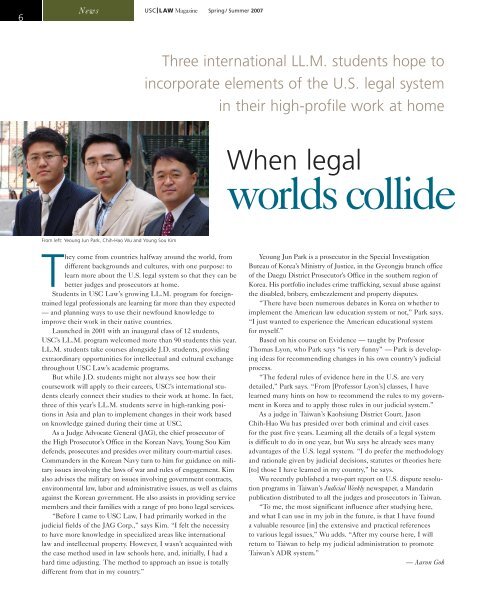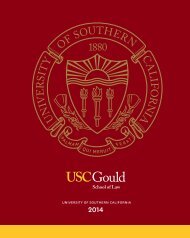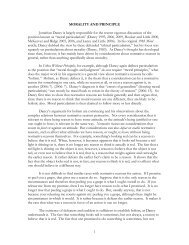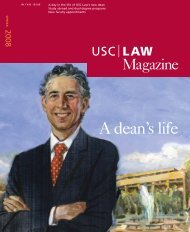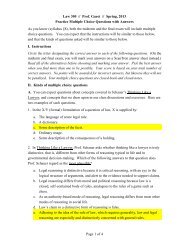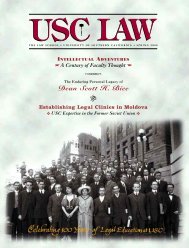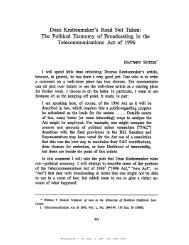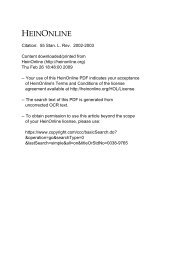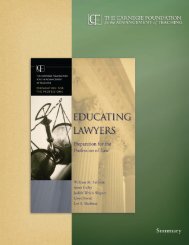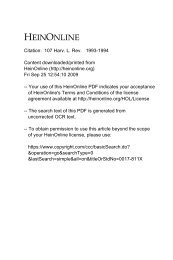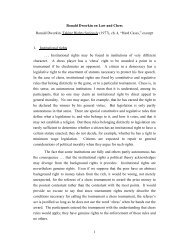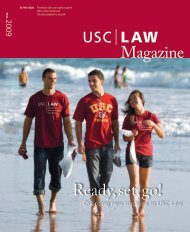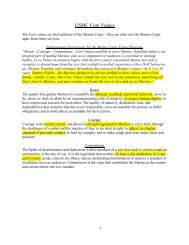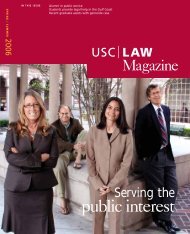Redemption - USC Gould School of Law - University of Southern ...
Redemption - USC Gould School of Law - University of Southern ...
Redemption - USC Gould School of Law - University of Southern ...
- No tags were found...
Create successful ePaper yourself
Turn your PDF publications into a flip-book with our unique Google optimized e-Paper software.
6NewsMagazineSpring / Summer 2007Three international LL.M. students hope toincorporate elements <strong>of</strong> the U.S. legal systemin their high-pr<strong>of</strong>ile work at homeWhen legalworlds collideFrom left: Yeoung Jun Park, Chih-Hao Wu and Young Sou KimThey come from countries halfway around the world, fromdifferent backgrounds and cultures, with one purpose: tolearn more about the U.S. legal system so that they can bebetter judges and prosecutors at home.Students in <strong>USC</strong> <strong>Law</strong>’s growing LL.M. program for foreigntrainedlegal pr<strong>of</strong>essionals are learning far more than they expected— and planning ways to use their newfound knowledge toimprove their work in their native countries.Launched in 2001 with an inaugural class <strong>of</strong> 12 students,<strong>USC</strong>’s LL.M. program welcomed more than 90 students this year.LL.M. students take courses alongside J.D. students, providingextraordinary opportunities for intellectual and cultural exchangethroughout <strong>USC</strong> <strong>Law</strong>’s academic programs.But while J.D. students might not always see how theircoursework will apply to their careers, <strong>USC</strong>’s international studentsclearly connect their studies to their work at home. In fact,three <strong>of</strong> this year’s LL.M. students serve in high-ranking positionsin Asia and plan to implement changes in their work basedon knowledge gained during their time at <strong>USC</strong>.As a Judge Advocate General (JAG), the chief prosecutor <strong>of</strong>the High Prosecutor’s Office in the Korean Navy, Young Sou Kimdefends, prosecutes and presides over military court-martial cases.Commanders in the Korean Navy turn to him for guidance on militaryissues involving the laws <strong>of</strong> war and rules <strong>of</strong> engagement. Kimalso advises the military on issues involving government contracts,environmental law, labor and administrative issues, as well as claimsagainst the Korean government. He also assists in providing servicemembers and their families with a range <strong>of</strong> pro bono legal services.“Before I came to <strong>USC</strong> <strong>Law</strong>, I had primarily worked in thejudicial fields <strong>of</strong> the JAG Corp.,” says Kim. “I felt the necessityto have more knowledge in specialized areas like internationallaw and intellectual property. However, I wasn’t acquainted withthe case method used in law schools here, and, initially, I had ahard time adjusting. The method to approach an issue is totallydifferent from that in my country.”Yeoung Jun Park is a prosecutor in the Special InvestigationBureau <strong>of</strong> Korea’s Ministry <strong>of</strong> Justice, in the Gyeongju branch <strong>of</strong>fice<strong>of</strong> the Daegu District Prosecutor’s Office in the southern region <strong>of</strong>Korea. His portfolio includes crime trafficking, sexual abuse againstthe disabled, bribery, embezzlement and property disputes.“There have been numerous debates in Korea on whether toimplement the American law education system or not,” Park says.“I just wanted to experience the American educational systemfor myself.”Based on his course on Evidence — taught by Pr<strong>of</strong>essorThomas Lyon, who Park says “is very funny” — Park is developingideas for recommending changes in his own country’s judicialprocess.“The federal rules <strong>of</strong> evidence here in the U.S. are verydetailed,” Park says. “From [Pr<strong>of</strong>essor Lyon’s] classes, I havelearned many hints on how to recommend the rules to my governmentin Korea and to apply those rules in our judicial system.”As a judge in Taiwan’s Kaohsiung District Court, JasonChih-Hao Wu has presided over both criminal and civil casesfor the past five years. Learning all the details <strong>of</strong> a legal systemis difficult to do in one year, but Wu says he already sees manyadvantages <strong>of</strong> the U.S. legal system. “I do prefer the methodologyand rationale given by judicial decisions, statutes or theories here[to] those I have learned in my country,” he says.Wu recently published a two-part report on U.S. dispute resolutionprograms in Taiwan’s Judicial Weekly newspaper, a Mandarinpublication distributed to all the judges and prosecutors in Taiwan.“To me, the most significant influence after studying here,and what I can use in my job in the future, is that I have founda valuable resource [in] the extensive and practical referencesto various legal issues,” Wu adds. “After my course here, I willreturn to Taiwan to help my judicial administration to promoteTaiwan’s ADR system.”— Aaron Goh


